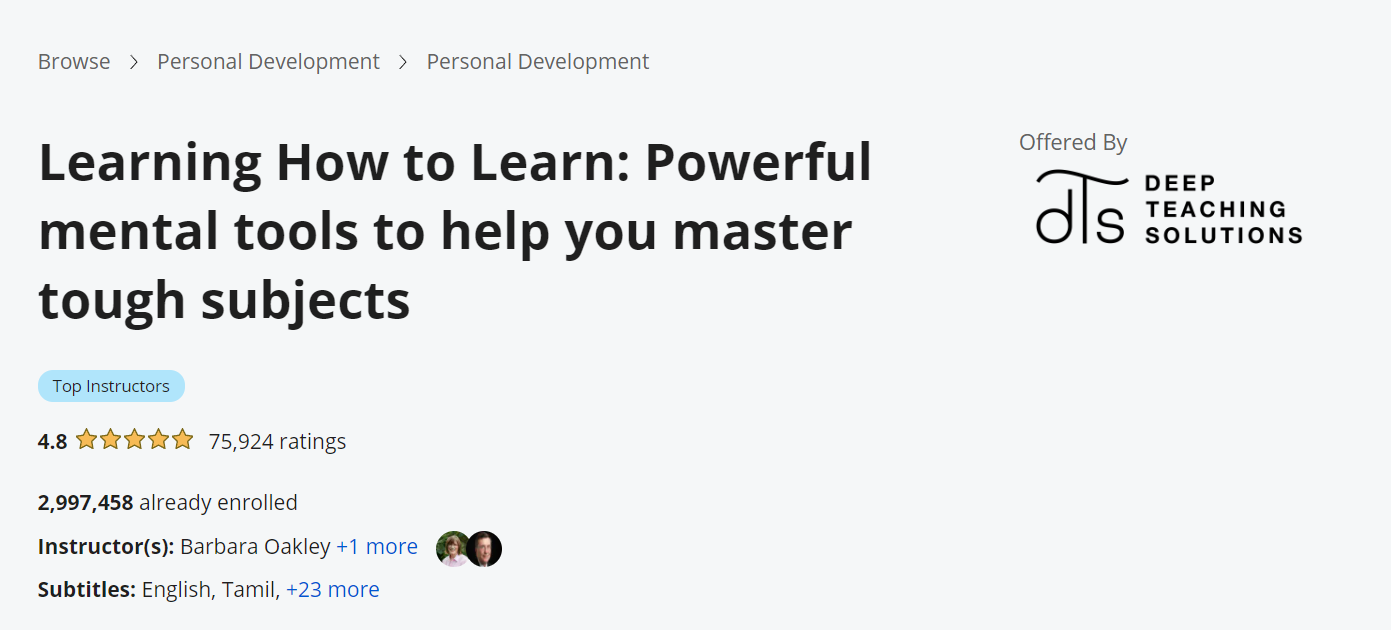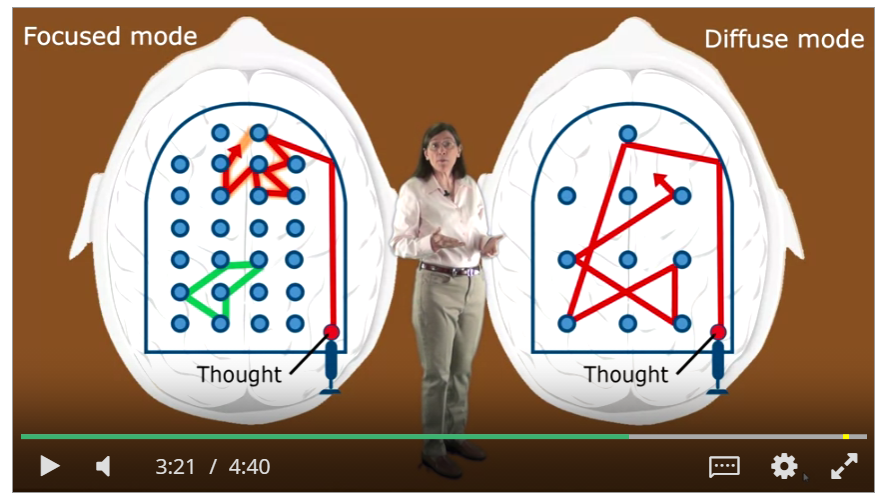- Home
- Courses
- Life Skills Courses
- Learning How to Learn
My Review of the "Learning How to Learn" Course on Coursera
If you’re a lover of learning, you’ve likely heard of the popular "Learning How to Learn" course on Coursera. So, is it actually useful? Here's my review...

This post may contain affiliate links. Please read my disclosure for more information.
If there's any skill that's worth mastering, it's learning how to learn.
After all, once you figure out the most effective way to learn, you can transfer this knowledge to any subject of your choice.
As a lover of learning and personal development myself, I was really intrigued to discover the Learning How to Learn course on Coursera.
Here is my review of the course, to help anyone who's thinking of enrolling in it themselves.
Learning How to Learn Coursera Review
One of the first things that caught my eye about the course is that over 2 million people worldwide have already enrolled in it.
So evidently it must be offering a lot of value...
But what can you expect upon enrolling?
Learning How to Learn is taught by two experienced instructors: Barbara Oakely, Professor of Engineering at Oakland University, and Dr. Terrence Sejnowski, Francis Crick Professor at the Salk Institute for Biological Studies.
Both instructors are incredibly knowledgeable, yet they're great at distilling complex scientific concepts into small bites that you can understand and apply right away.
As explained in Week 1, the purpose of the course is to help you reframe how you think about learning, so you can reduce your frustration and increase your understanding.
You're not expected to have an in-depth background in any particular subject.
Instead, you're expected to take the ideas in the course and apply them to whatever subject you're trying to learn or improve in, to help you learn more deeply and effectively.
Here are the course modules:
- Week 1: What is Learning?
- Week 2: Chunking
- Week 3: Procrastination and Memory
- Week 4: Renaissance Learning and Unlocking Your Potential
I finished the course in four days, completing about "one week" of course material per day.
This was a comfortable pace to go at, because it gave me extra flexibility to watch some of the bonus videos in the course.
This pace also allowed me to sleep on what I learned each day and let it simmer in my mind... you'll know exactly what I mean by this when you take the course!
Below, I'll be sharing my favourite parts of the course. Rather than summarizing each week (and giving too much away), I'll be sharing a highlight from each week.
=> View the "Learning How to Learn" Course Syllabus here.
Highlights from Each Week of the Course

Week 1: Interview with "Benny the Irish Polyglot"
One of the highlights of Learning How to Learn are the interviews that are included in the course.
You'll hear experts from a variety of different disciplines talking about their best tips for learning more effectively.
My favourite interview was the interview with Benny the Irish Polyglot in Week 1. This isn't even a core part of the course - it's an optional video at the end - but I'm glad I watched it because I found it really motivational and informative.
Benny is a full-time language hacker and the author of the book Fluent in 3 Months. In the interview, he talks about the wrong reasons for learning a language, how to avoid perfectionism when you're a beginner, and some of the strategies he's used to become fluent in seven languages.
Personally I'm absolutely fascinated by languages, so watching the interview made me even more determined to reach the point of fluency in at least one another language! I'll keep you updated...
Week 2: Overlearning and Deliberate Practice
In week 2 of the course, you learn about "illusions of learning".
An example of an illusion of learning is overlearning.
Overlearning is when you're learning a new idea - for example, a new vocabulary word or problem solving approach - and you keep practicing it over and over again during the same study session, even after you've mastered it.
Research has shown that this can be a waste of valuable learning time.
The reality is, once you've got the basic idea down during a session, continuing to hammer away at it during the same session doesn't do much to strengthen long term memory connections.
Moreover, overlearning can bring the illusion of competence that you've mastered the full range of material, when you've actually only mastered the easy stuff.
Instead, you want to balance your studies by deliberately focusing on what you find more difficult and spacing out your repetition sessions.
Deliberate practice involves going the extra mile, but it's often what makes the difference between a good student and a great student!
Week 3: Process Versus Product
Another part of the Learning How to Learn course that I really resonated with was the definition of process vs product.
Process means the flow of time and the habits and actions associated with that flow of time.
Product is an outcome, for example, a homework assignment that you need to finish.
To prevent procrastination you should avoid concentrating on product.
Instead, your attention should be on building processes - or simple habits - that coincidentally allow you to do the unpleasant tasks that need to be done.
For example, rather than planning to finish an entire essay, which might seem overwhelming, you could set a timer for 25 minutes and do as much work as you can during that time.
It's often your estimation of the product, not the process, that causes you to procrastinate.
Once you overcome the mental hurdle and make it your aim to just get started on the process, you'll be amazed at how much you can achieve!
Week 4: The Role of Location in Recall
Learning How to Learn also offers many insightful test taking tips.
For example, I learned that recalling material when you are outside your usual place of study can help you strengthen your grasp of the material.
When you are learning something new, you often take in subliminal cues from the room and space around you at the time you were originally learning the material.
This can actually throw you off when you take tests, because you often take tests in a room different from the room you were learning in.
By recalling and thinking about the material while you are in various physical environments, you become independent of cues from any one location.
This is a small tip, but it can be really useful, especially if you have the opportunity to study in the room when you'll be taking your test.
Final Thoughts

In conclusion, I thoroughly enjoyed the Learning How to Learn course on Coursera.
It introduced me to effective new learning strategies for holding my focus and embedding information more deeply and powerfully in my mind.
Overall, this is really a course for everyone.
You can benefit from the ideas whether you're struggling in high school or soaring through math and science at graduate levels at a university.
I wish I had taken this course before I started college, but to anyone thinking of enrolling, it's never too late to start learning how to learn!
=> Enroll in the Learning How to Learn Course here.
Happy learning!
Related:
Thanks for reading! If you liked this content, share with a friend:
Recent Articles
-
5 Subtle Habits That Quietly Transform Your Life Over Time
Jan 25, 26 08:21 PM
Progress towards the things that matter isn't usually loud or dramatic. Here are 5 subtle habits that quietly transform your life over time. -
Inner Work with Marcus Lynn | How to Make Change More Realistic
Jan 19, 26 06:24 PM
In this spotlight interview, therapist Marcus Lynn explains how we can begin to see emotions as information and make change more realistic in our lives. -
7 Best Personal Development Courses to Grow Your Skills and Mindset
Jan 01, 26 11:04 PM
To reach your goals for the year, there are are certain skills you might need to unlock first. Here are the best personal development courses to level up your life in 2026.






















